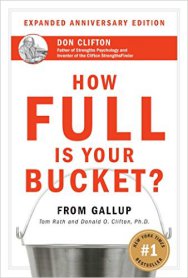When our good intentions evaporate and the truth conveyed by saints and scripture no longer inspires, we can always check out what researchers say about speech. Here are three researched-based reasons to persevere on the positive path, from How Full Is Your Bucket? Tom Rath and Don Clifton’s best-selling book on improving personal and workplace satisfaction.
1–Negativity kills. According to Rath and Clifton, one of the most devastating “successful” cases of psychological warfare on record occurred during the Korean War. Why did so many American soldiers held in North Korean prison camps die, when they were given adequate food and water and were not subject to physical torture? Their captors broke their will to live by creating a culture of self-defeat: using informants from within the group, self-criticism, broken loyalties and withholding positive emotional support (such as supportive letters from home, while allowing all letters with bad news or negative recriminations). This negativity crushed the men’s spirits, and it was enough to kill them.
2–Praise raises productivity. Rath and Clifton studied workplace environments, comparing those in which employees received regular recognition with those who didn’t. Among the results (which are nuanced and fully developed in the book) are increased productivity, increased engagement with colleagues, better safety records and increased likelihood of staying in the organization.
3–Positivity improves health and increases longevity. A Mayo clinic study cited by Rath and Clifton found a link between optimistic approaches to life and longer life. Negative approaches to life may actually reduce life expectancy more than smoking cigarettes. When we increase the positive interactions we have with each other , we’re doing far more than just being “nice.” It seems our need for affirmation is embedded in our DNA, and when that need isn’t met, the consequences are painful.
, we’re doing far more than just being “nice.” It seems our need for affirmation is embedded in our DNA, and when that need isn’t met, the consequences are painful.
Rath and Clifton created a powerful metaphor to help us remember the simplicity of the truths they discovered. They compare our heart to a bucket–and challenge us to fill the buckets of those we meet by recognition, kindness and praise. A bonus is that when we do, our own levels of happiness and optimism increase.
And they advise us to avoid “bucket dipping” and “bucket dippers”–those who “dip” from others’ store of optimism by hurtful or neglectful words and actions.
Here’s the advice of St. Paul in Ephesians 4:29:
Do not let any unwholesome talk come out of your mouths, but only what is helpful for building others up according to their needs, that it may benefit those who listen.
So following the way of Christ is, even if we examine it with the rather dull tools of data, an evidence-based practice. Truth is just truth, and everyone benefits the more we’re aligned to it.

This post is part of a  series (see A Lenten Invitation from a Babbling Brook: Focus on Speech and Silence). To receive new installments, you’re invited to Follow Sparrowfare by placing your email address in the FOLLOW box in the sidebar. Please share the posts that speak to you. In this contentious time, let’s spread the word about the importance of our words.
series (see A Lenten Invitation from a Babbling Brook: Focus on Speech and Silence). To receive new installments, you’re invited to Follow Sparrowfare by placing your email address in the FOLLOW box in the sidebar. Please share the posts that speak to you. In this contentious time, let’s spread the word about the importance of our words.
Save
Save
Share this:




